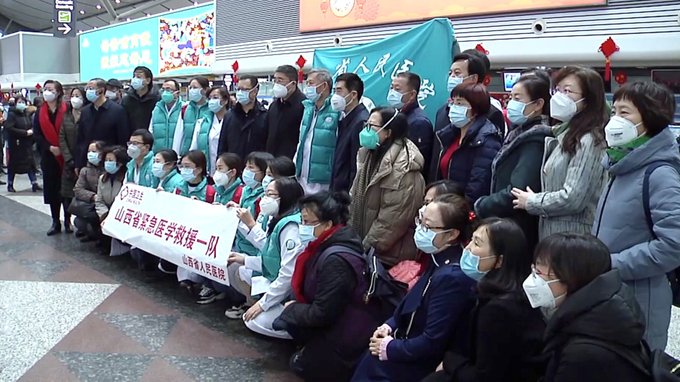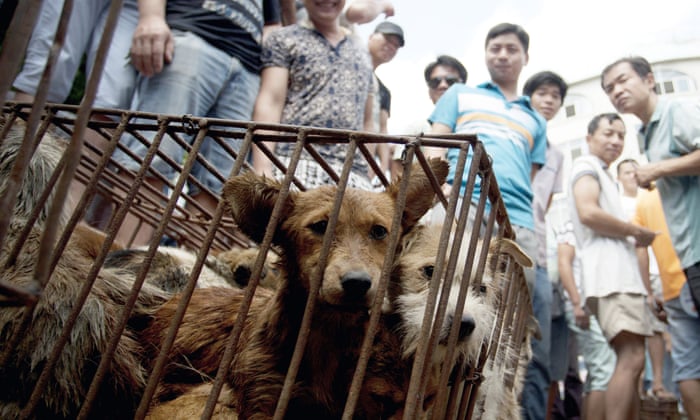By Paul Mozur

A man who arrived from Hubei Province in China crossing the Jiujiang Yangtze River Bridge near a checkpoint in Jiujiang, Jiangxi Province.
GUANGZHOU, China — One person was turned away by hotel after hotel after he showed his ID card.
Another was expelled by fearful local villagers.
A third found his most sensitive personal information leaked online after registering with the authorities.
These outcasts are from Wuhan, the capital of Hubei Province, which is at the center of a rapidly spreading viral outbreak that has killed more than 420 people in China and sent fear rippling around the world.
These outcasts are from Wuhan, the capital of Hubei Province, which is at the center of a rapidly spreading viral outbreak that has killed more than 420 people in China and sent fear rippling around the world.
They are pariahs in China, among the millions unable to go home and feared as potential carriers of the mysterious coronavirus.
All across the country, despite China’s vast surveillance network with its facial recognition systems and high-end cameras that is increasingly used to track its 1.4 billion people, the government has turned to familiar authoritarian techniques — like setting up dragnets and asking neighbors to inform on one another — as it tries to contain the outbreak.
It took the authorities about five days to contact Harmo Tang, a college student studying in Wuhan, after he returned to his hometown, Linhai, in eastern Zhejiang Province.
All across the country, despite China’s vast surveillance network with its facial recognition systems and high-end cameras that is increasingly used to track its 1.4 billion people, the government has turned to familiar authoritarian techniques — like setting up dragnets and asking neighbors to inform on one another — as it tries to contain the outbreak.
It took the authorities about five days to contact Harmo Tang, a college student studying in Wuhan, after he returned to his hometown, Linhai, in eastern Zhejiang Province.
Mr. Tang said he had already been under self-imposed isolation when local officials asked for his personal information, including name, address, phone number, identity card number and the date he returned from Wuhan.
Within days, the information began to spread online, along with a list of others who returned to Linhai from Wuhan.
Local officials offered no explanation but returned a few days later to fasten police tape to his door and hang a sign that warned neighbors that a Wuhan returnee lived there.
Local officials offered no explanation but returned a few days later to fasten police tape to his door and hang a sign that warned neighbors that a Wuhan returnee lived there.
The sign included an informant hotline to call if anyone saw him or his family leave the apartment.
Mr. Tang said he received about four calls a day from different local government departments.
“In reality there’s not much empathy,” he said.
“In reality there’s not much empathy,” he said.
“It’s not a caring tone they’re using. It’s a warning tone. I don’t feel very comfortable about it.”
Of course, China has a major incentive to track down potential carriers of the disease.
Of course, China has a major incentive to track down potential carriers of the disease.
The Chinese coronavirus outbreak has put parts of the country under lockdown, brought the world’s second-largest economy to a virtual standstill and erected walls between China and the rest of the world.

A person suspected of having the coronavirus in Wuhan, China, was taken from an apartment last week.
Still, even some government officials called for understanding as concerns about prejudice spread. Experts warned such marginalization of an already vulnerable group could prove counterproductive, further damaging public trust and sending those who should be screened and monitored deeper underground.
“We are paying attention to this issue,” Ma Guoqiang, the Chinese Communist Party secretary of Wuhan, said at a news conference there last Tuesday.
“I believe that some people may label Hubei people or report them, but I also think most people will treat Hubei people with a good heart.”
While networks of volunteers and Christian groups have been vocal about offering help, many local leaders have focused efforts on finding and isolating people from Hubei.
“We are paying attention to this issue,” Ma Guoqiang, the Chinese Communist Party secretary of Wuhan, said at a news conference there last Tuesday.
“I believe that some people may label Hubei people or report them, but I also think most people will treat Hubei people with a good heart.”
While networks of volunteers and Christian groups have been vocal about offering help, many local leaders have focused efforts on finding and isolating people from Hubei.
On big screens and billboards, propaganda videos and posters warn people to stay inside, wear masks and wash hands.
In the northern province of Hebei, one county offered bounties of 1,000 yuan, or about $140, for each Wuhan person reported by residents.
In the northern province of Hebei, one county offered bounties of 1,000 yuan, or about $140, for each Wuhan person reported by residents.
Images online showed towns digging up roads or deputizing men to block outsiders.
Some apartment-building residents barricaded the doors of their towers with China’s ubiquitous ride-share bikes.
In the eastern province of Jiangsu, quarantine turned to imprisonment after authorities used metal poles to barricade shut the door of a family recently returned from Wuhan.
In the eastern province of Jiangsu, quarantine turned to imprisonment after authorities used metal poles to barricade shut the door of a family recently returned from Wuhan.
To get food, the family relied on neighbors who lowered provisions with a rope down to their back balcony, according to a local news report.
Scared for the safety of his children as conditions at home worsened, Andy Li, a tech worker from Wuhan traveling with his family in Beijing, rented a car and began driving south to Guangdong, an effort to find refuge with relatives there.
Scared for the safety of his children as conditions at home worsened, Andy Li, a tech worker from Wuhan traveling with his family in Beijing, rented a car and began driving south to Guangdong, an effort to find refuge with relatives there.
In Nanjing, he was turned away from one hotel before getting a room at a luxury hotel.
There he set up a self-imposed family quarantine for four days, until local authorities ordered all people from Wuhan to move to a hotel next to the city’s central rail station.
There he set up a self-imposed family quarantine for four days, until local authorities ordered all people from Wuhan to move to a hotel next to the city’s central rail station.
Mr. Li said the quarantine hotel did not seem to be doing a good job isolating people.
Food delivery workers came and went, while gaps in the doors and walls allowed drafts in.
“They’re only working to separate Wuhan people from Nanjing people,” Mr. Li said.
“They’re only working to separate Wuhan people from Nanjing people,” Mr. Li said.
“They don’t care at all if Wuhan people infect each other.”
To help, he stuffed towels and tissues under the door to block the drafts.
“I’m not complaining about the government," Mr. Li said.
To help, he stuffed towels and tissues under the door to block the drafts.
“I’m not complaining about the government," Mr. Li said.
“There will always be loopholes in policy. But in a selfish way I’m just really worried about my children.”

Delivering packages protected by a mask and special suit in Wuhan.

Delivering packages protected by a mask and special suit in Wuhan.
Across the country, the response from local authorities often resembles the mass mobilizations of the Mao era rather than the technocratic, data-driven wizardry depicted in propaganda about China’s emerging surveillance state.
They have also turned to techniques Beijing used to fight the outbreak of SARS, another deadly disease, in 2002 and 2003, when China was much less technologically sophisticated.
Checkpoints to screen people for fevers have popped up at tollbooths, at the front gates of apartment complexes and in hotels, grocery stores and train stations.
Checkpoints to screen people for fevers have popped up at tollbooths, at the front gates of apartment complexes and in hotels, grocery stores and train stations.
Often those wielding the thermometer guns don’t hold them close enough to a person’s forehead, generating unusually low temperature readings.
Such checks were worthless, for instance, against one man in the western province of Qinghai, whom police are investigating on suspicion that he covered up his symptoms to travel.
Authorities have used computerized systems that track ID cards — which must be used to take most long-distance transport and stay in hotels — to round up people from Wuhan.
Authorities have used computerized systems that track ID cards — which must be used to take most long-distance transport and stay in hotels — to round up people from Wuhan.
Yet one article about the ID system in The People’s Daily, the mouthpiece for the Chinese Communist Party, included a plea to all passengers on affected flights and trains to report themselves.
The campaigns have turned life upside down in unexpected ways.
The campaigns have turned life upside down in unexpected ways.
Jia Yuting, a 21-year-old student in Wuhan, had already been back in her hometown in central China for 18 days — longer than the 14-day quarantine period — when she got news her grandfather was sick in a nearby village.
During a visit to see him, she followed local instructions broadcast on speakers in the village and registered her personal details with the local Communist Party Committee.
When a middle-school teacher randomly reached out to her on the messaging app WeChat to inquire about her health, she realized her data had been leaked online and was spreading on a list.
When a middle-school teacher randomly reached out to her on the messaging app WeChat to inquire about her health, she realized her data had been leaked online and was spreading on a list.
Later, she received a threatening phone call from a man who lived in her home city.

Checkpoints where people’s temperatures are checked, though sometimes not carefully, have proliferated.

Checkpoints where people’s temperatures are checked, though sometimes not carefully, have proliferated.
“Why did you come back Wuhan? You should have stayed there. You Wuhan dog!” she recalled him saying.
Authorities offered her no explanation for how it happened, and insisted such leaks did not disrupt her regular life.
Authorities offered her no explanation for how it happened, and insisted such leaks did not disrupt her regular life.
Three days after her visit to the village, her grandfather died.
Local officials there immediately told her family that she would not be allowed to return to the village to pay her final respects at a funeral that was taking place more than three weeks after she had returned from Wuhan.
“I feel that the villagers are ignorant and the government isn’t helping; instead it’s leaking the information everywhere without telling them that I don’t have any symptoms,” she said, adding that she felt guilty she could not be there to comfort her grandmother.
“I was very close to my grandfather. I think it’s not humane — it’s cruel.”
“I feel that the villagers are ignorant and the government isn’t helping; instead it’s leaking the information everywhere without telling them that I don’t have any symptoms,” she said, adding that she felt guilty she could not be there to comfort her grandmother.
“I was very close to my grandfather. I think it’s not humane — it’s cruel.”














 Paramedics transporting a man believed to be Hong Kong’s first Wuhan coronavirus patient last week.
Paramedics transporting a man believed to be Hong Kong’s first Wuhan coronavirus patient last week.



